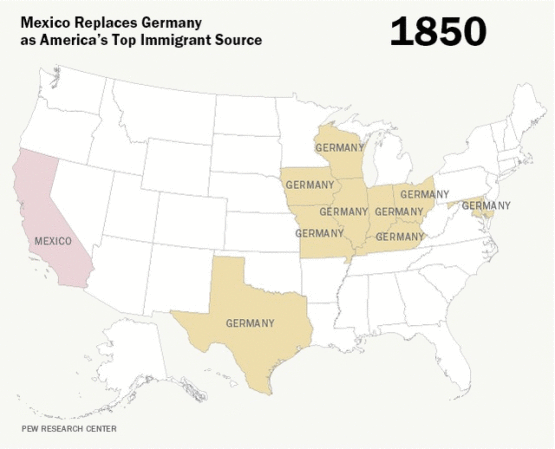A few weeks ago I wrote a post about the popular languages in the US. One of the surprises was that, after English and Spanish, the most popular language spoken was German. I wondered if it might be the descendants of German immigrants learning the language of their homeland or what. We don’t think of German immigrants as a particularly recent thing.
If only I read my own blog. I wrote a post in 2010 about German immigration into the United States. I quoted from an article:
Germans are leaving their country in record numbers but unlike previous waves of migrants who fled 19th century poverty or 1930s Nazi terror, these modern day refugees are trying to escape a new scourge — unemployment.
Flocking to places as far away as the United States, Canada and Australia as well as Norway, the Netherlands and Austria more than 150,000 Germans packed their bags and left in 2004 — the greatest exodus in any single year since the late 1940s.
High unemployment that lingers at levels of more than 20 percent in some parts of Germany and dim prospects for any improvement are the key factors behind the migration. In the 15 years since German unification more than 1.8 million Germans have left.
Anyhow, it’s not just a recent thing, but was more prominent in relatively recent history than I thought of. Pew points out that it’s Germans, as opposed to Italians or Irish like I might have guessed, who Mexican immigrants have displaced as our biggest source of immigration.
As you can see from the map, as recently as 1960 the Germans dominated the immigration landscape (to the extent that any country did), and in 1990 they were right up there with Mexicans.
About the Author
8 Responses to German America
Leave a Reply
please enter your email address on this page.


It’s because of the Amish.
http://en.wikipedia.org/wiki/Pennsylvania_German_language
That was one theory posited. I’m not sure how big of an Amish presence many of those states have.
All of the states on that map except for Texas have significant populations. Also many Old Order Mennonites speak German as their first language. They are generally found in the same areas as the Amish.
http://en.wikipedia.org/wiki/List_of_U.S._states_by_Amish_population
The Mennonite angle had occurred to me, as I associate them with a number of the states where German shows up.
To clarify, though, I was referring to the map on my previous post, which ranged from Idaho and Utah to Alabama and Arkansas.
The Italian speakers have mostly died off. Surviving children of the big wave of Italian immigrants (1875-1924), the bilinguals, are mostly in their 80s or gone. I grew up hearing Italian spoken every day of my childhood at home. At some family gatherings when I was very young, it was the predominant language spoken, though none of my generation could understand it. In the neighborhood where I was born (but not reared), it was common to hear Italian spoken on the streets and in local stores. I’d say there were 100 Italian only or bilingual Italian-English speakers in my extended family during my childhood. Now, I can only think of 5, including my parents. All are elderly.
I would have guessed that most of the German speakers had died off, too. But apparently they were coming in significant numbers later than I had guessed.
The Italian speakers have mostly died off.
FWIW, Italian is weird since I live in a heavily Italian part of the country, and while everybody ends up learning some words, nobody really speaks the language well enough beyond the first generation, but the cultural links end up morphing to be a weird not quite Italian and not quite assimilated American culture. In other words, some Italian Americans stand out, but Italians would write them off as Americans.
FWIW, based on my nephew and younger cousins, I suspect that Haitian Creole will undertake a similar decline as second and third generation children blend in with others and grow up in less Haitian environments. My nephew hasn’t picked up much in terms of the language, and other than some cultural traits, he’s (sadly) not that dissimilar from other young native born African Americans.
I saw quite a bit of this second-generation language change growing up in Connecticut. Although most of the city’s immigration had occurred decades earlier, there had been a sizable influx of immigrants from Portugal in roughly the 1945-1960 period. Many had come from the Azores, which the Salazar dictatorship had treated somewhat like a Lusitanian version of Appalachia.
Quite a few of my classmates in elementary and especially high school were the U.S.-born children of Portuguese immigrants. Almost without exception they spoke English perfectly well but had a mediocre grasp of Portuguese at best. I didn’t interact with too many of their immigrant parents, but the idea seemed to be that they could speak English to varying degrees of ability but clearly were much more at home in Portuguese.